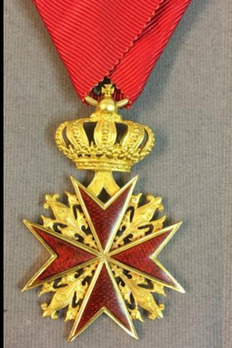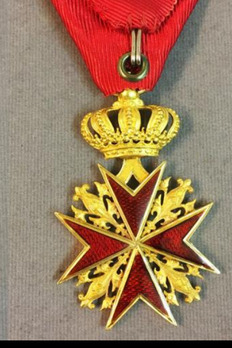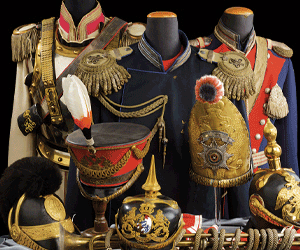Military Order of Saint Stephen, Type II, Knight
SKU: 01.ITA.0108.205.01
Estimated market value:


Estimated market value:
Attributes
Physical Description
This insignia is a red enamelled, gold-edged cross, similar to that of the Knights of Malta. In the angles are fleur-de-lis and above the cross is a ducal crown of Gold. The ribbon is red.
History
The Military Order Of Saint Stephen was originally founded by Cosimo I de'Medici, First Grand Duke of Tuscany, in commemoration of his victory over the French in August 1554. It was officially confirmed by Pope Pius IV in 1561.
The purpose of the Order was to protect the Catholic Church by fighting the Ottoman Turks and Mediterranean pirates.
Membership eligibility was restricted to individuals capable of tracing their noble lineage back 4 generations on both sides of their family. They must also be practitioners of the Catholic faith, and be a minimum of 18 years old.
This Order was amended by Grand Duke Ferdinand III on December 22, 1817, wherein he added grades to the Order.
The Order was definitively suppressed in 1859 when the Duchy of Tuscany was annexed into the Kingdom of Sardinia.
It is also known as the Holy Military Order of St. Stephen, Pope and Martyr.
There is a great deal of variation in the design, composition, and size of the Order awards, and some examples may feature brilliants.
The Type II Order features several new grades and award variations.
The new Order grades include Grand Cross, Commander (II Class Prior, III Class Bailiff), and Knight. Each grade is accompanied by a Breast Star with the same design but decreasing size.
The crosses may feature a surmounting crown suspension or a crown suspension surmounted by a trophy of arms.
Th Knight grade is also known as the Knights Ordinary. Specifically, the Knight (with crown) may also be known as Knight by Grace, and the Knight (with crown and trophy of arms) may also be known as Knight by Right or Knight of Justice.
Each group of Knights filled a unique role in the Order.
The reverse of the Knight may be enamelled, engraved, or plain.


Comments
Sign in to comment and reply.


Scroll Top